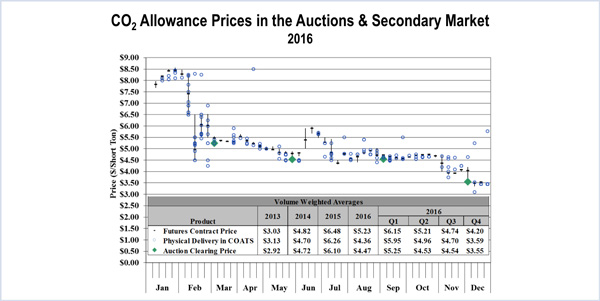By Michael Brooks
The nine states comprising the Regional Greenhouse Gas Initiative have agreed to accelerate reductions in power sector carbon dioxide emissions by lowering the cap-and-trade program’s annual allowances by 30% over 10 years.
The changes to the program, announced Wednesday, also include the addition of an Emissions Containment Reserve (ECR), in which the participating states — Connecticut, Delaware, Maine, Maryland, Massachusetts, New Hampshire, New York, Rhode Island and Vermont — can withhold emission allowances from the quarterly auctions if prices fall below a certain threshold.
“The RGGI states are demonstrating our commitment to a strengthened RGGI program that will utilize innovative new mechanisms to secure significant carbon reductions at a reasonable price on into the next decade, working in concert with our competitive energy markets and reliability goals,” Connecticut Public Utilities Regulatory Authority Chair Katie Dykes, who serves as chair of the RGGI board of directors, said in a statement.
RGGI currently reduces the emissions cap by 2.5% annually, targeting 78.2 million tons in 2020. The changes set the 2021 cap at about 75.1 million tons and reduces it by 2.275 million tons (3%) annually after.

RGGI auction clearing prices fell over the course of 2016, spurring calls for reforms to the cap-and-trade program. | Potomac Economics
Environmentalists and Massachusetts officials last year called for doubling the current rate of reduction, but Maryland Environment Secretary Ben Grumbles balked at the proposal, arguing that the state would be at a disadvantage because its coal-fired power plants must compete in PJM, while most states in the program are in the ISO-NE footprint. (See Md. Balks at Proposed Emission Cuts as RGGI States Ponder Future.)
Grumbles said such an aggressive rate could cause Gov. Larry Hogan to withdraw the state from the program, as New Jersey Gov. Chris Christie did in 2011.
“Maryland is proud of the teamwork among states to achieve consensus for a stronger and broader, balanced and sustainable RGGI,” Grumbles, who serves as the RGGI board secretary and treasurer, said about the agreement.
“Maryland is committed to finding real bipartisan, common sense solutions to protect our environment, combat climate change and improve our air quality,” Hogan said in a statement. “By working together, we are showing that it is possible to find consensus to protect our natural resources, promote clean energy, and grow our economy for current and future generations.”
With the implementation of ECRs starting in 2021, states would be able to withhold up to 10% of their allowances if auction prices fall below $6/ton, with the price trigger rising 7% each year after. The withheld allowances would not be bankable, meaning they could not be resold in a future auction.
Low prices in previous auctions spurred the initial calls for reforms last year, and prices have only continued to fall since. The latest auction, on June 7, saw a $2.53/ton clearing price, a 15% drop from the previous quarter and 44% from a year ago.
RGGI will hold a meeting at the Maryland Public Service Commission in Baltimore on Sept. 25 to solicit public and stakeholder feedback on the changes.




